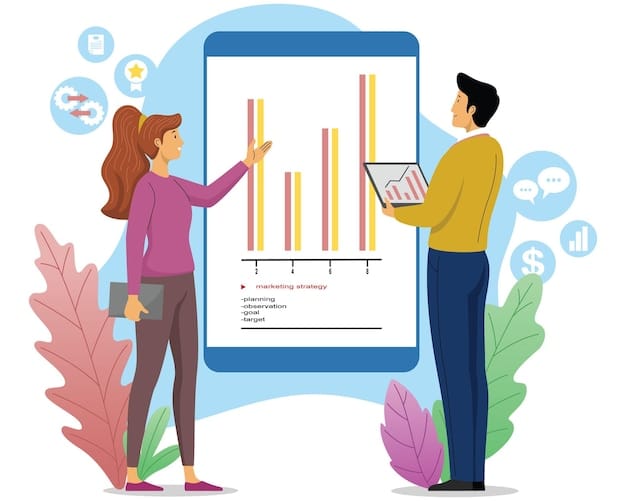Budgeting for Inflation: Top 5 Strategies to Protect Your Savings in 2025

Budgeting for inflation in 2025 requires proactive strategies; this involves adjusting your budget to account for rising prices, investing in assets that outpace inflation, reducing debt, optimizing expenses, and diversifying income streams to safeguard your financial stability.
Navigating the financial landscape of 2025 requires a keen understanding of budgeting for inflation. As the cost of everyday goods and services continues to rise, it’s crucial to implement effective strategies to protect your savings and maintain your financial well-being. How can you shield your financial future from the impact of inflation?
Understanding Inflation and Its Impact on Your Budget
Inflation, the silent thief of purchasing power, erodes the value of money over time. It’s essential to grasp how inflation affects your personal finances to proactively adjust your budget and investment strategies.
Let’s delve deeper into understanding inflation and how it impacts your financial life.
What is Inflation?
Inflation is the rate at which the general level of prices for goods and services is rising, and subsequently, purchasing power is falling. Central banks typically aim for a low and stable inflation rate, often around 2%, to encourage economic growth.
How Inflation Affects Your Budget
- Increased Expenses: Everyday items like groceries, gas, and utilities become more expensive, straining your budget.
- Reduced Savings: The real value of your savings decreases if the interest rate is lower than the inflation rate.
- Investment Returns: Inflation can erode the real return on investments if the returns don’t outpace the inflation rate.
For example, if you have $100 in a savings account earning 1% interest and inflation is at 3%, your real return is -2%. To effectively combat these effects, you need a robust strategy.

In conclusion, understanding inflation is the first step in protecting your budget. Being aware of how rising prices affect your spending and savings will empower you to take proactive measures.
Strategy 1: Adjust Your Budget to Account for Rising Prices
One of the most direct ways to combat inflation is to meticulously review and adjust your budget. This involves identifying areas where you can cut back and reallocating funds to cover essential expenses.
This is one of the easiest and most important thing you can do to protect your money.
Review Your Current Spending
Start by tracking your spending for a month to identify where your money is going, this provides a solid starting point. Use budgeting apps, spreadsheets, or even a simple notebook to record every expense.
Identify Areas to Cut Back
Once you have a clear picture of your spending, look for non-essential expenses that you can reduce or eliminate. Consider cutting back on subscriptions, dining out, and entertainment, you might be surprised how much you can save.
- Negotiate Bills: Contact your service providers (internet, cable, insurance) to negotiate lower rates.
- DIY Solutions: Opt for DIY solutions for home maintenance and repairs instead of hiring professionals.
- Meal Planning: Plan your meals in advance to avoid impulse purchases and reduce food waste, which are the silent but deadly budget killers.
Adjusting your budget can be as simple as brewing coffee at home instead of buying it every day. Small changes can add up to significant savings over time, helping you keep pace with inflation.
Ultimately, adjusting your budget is about making informed choices and prioritizing your spending to ensure you can cover your essential needs while keeping your financial goals on track.
Strategy 2: Invest in Assets That Outpace Inflation
Investing wisely is another critical strategy for preserving your wealth during inflationary periods. Certain assets tend to perform well and outpace inflation, providing a hedge against rising prices.
Diversifying your investments is an intelligent way to secure your financial future.
Consider Inflation-Protected Securities
Treasury Inflation-Protected Securities (TIPS) are designed to protect investors from inflation. The principal of TIPS increases with inflation and decreases with deflation, as measured by the Consumer Price Index.
Explore Real Estate Investments
Real estate can be a good hedge against inflation, as property values and rental income tend to rise during inflationary periods but can be a more complex way to invest.
Diversify with Commodities
- Gold: Often considered a safe-haven asset, gold tends to maintain its value during times of economic uncertainty and inflation.
- Silver: A bit more affordable than Gold, Silver is the little brother that you might consider during recession.
- Other Commodities: Investing in commodities like oil, natural gas, and agriculture can provide a hedge, as their prices tend to rise with inflation.
For example, allocating a portion of your portfolio to TIPS or real estate can help ensure that your investments keep pace with or exceed the inflation rate, preserving your purchasing power.

Diversifying your investments across asset classes that have historically performed well during inflationary periods is a prudent approach to safeguarding your financial future. Consider consulting with a financial advisor to determine the best investment strategy for your specific goals and risk tolerance.
Strategy 3: Focus on Reducing Debt
High levels of debt can become particularly burdensome during inflationary periods, as interest rates may rise, increasing your monthly payments. Focusing on reducing debt can free up cash flow and protect your finances.
Reducing debt is important, and will help you going forward.
Prioritize High-Interest Debt
Start by identifying and prioritizing high-interest debts, such as credit card balances and personal loans. These debts can quickly accumulate interest, making them more expensive over time.
Debt Consolidation
Consider consolidating your debts into a single loan with a lower interest rate. This can simplify your payments and potentially save you money on interest charges.
Create a Debt Repayment Plan
- Avalanche Method: Focus on paying off the debt with the highest interest rate first, while making minimum payments on other debts.
- Snowball Method: Focus on paying off the smallest debt first for a psychological win, then roll that payment into the next smallest debt.
For example, if you have a credit card with a 20% interest rate and a personal loan with a 10% interest rate, focus on paying off the credit card debt first. Reducing your debt burden can free up cash flow to cover rising expenses and reduce your overall financial stress.
Reducing debt is a crucial step in preparing for inflation. By prioritizing debt repayment, you can lower your monthly expenses and improve your financial stability, making it easier to weather economic challenges.
Strategy 4: Optimize Your Expenses
Optimizing your expenses involves identifying ways to get the most value for your money. This can include shopping around for better deals, taking advantage of discounts, and finding creative ways to save on everyday expenses.
Start paying attention to what you spend, it’s shocking.
Shop Around for Better Deals
Before making a purchase, take the time to compare prices from different retailers. Use online tools and apps to find the best deals on the products and services you need.
Take Advantage of Discounts and Coupons
Look for discounts, coupons, and promotional offers before making a purchase. Sign up for email newsletters, follow retailers on social media, and use coupon websites to find savings opportunities.
Embrace Frugality and Creativity
- Bulk Buying: Purchase non-perishable items in bulk when prices are low.
- Energy Efficiency: Invest in energy-efficient appliances and lighting to reduce your utility bills.
For example, compare prices on groceries at different stores and use coupons whenever possible. You can embrace frugal living by packing your lunch, carpooling, or using public transportation. Optimizing your expenses can free up significant cash flow to offset the impact of inflation.
By actively seeking out better deals and finding creative ways to save, you can stretch your budget further and make your money go further during inflationary times. Small changes can make a big difference in your overall financial health.
Strategy 5: Diversify Your Income Streams
Relying on a single source of income can be risky, especially during periods of economic uncertainty. Diversifying your income streams can provide a buffer against inflation and enhance your financial stability.
Having more ways to earn a living can be crucial to keep your head above water.
Explore Freelancing and Side Hustles
Consider pursuing freelance work or starting a side hustle to generate additional income. Online platforms offer various opportunities to leverage your skills and earn extra money.
Invest in Income-Generating Assets
Consider investments that provide a regular income stream, such as dividend-paying stocks, rental properties, or peer-to-peer lending.
Develop New Skills
- Online Courses: Invest in online courses or workshops to enhance your skills and increase your earning potential. Upskilling might be the most important thing you can do to get more money.
- Networking: Attend industry events, join professional organizations, and network with others in your field.
For instance, if you have a knack for writing, offer freelance writing services. If you have a spare room, consider renting it out on platforms. Diversifying your income streams can increase your financial resilience and help you keep pace with inflation.
By expanding your income sources, you can protect yourself from economic shocks and improve your overall financial security. A diversified income strategy provides a solid foundation for weathering inflationary pressures and achieving your financial goals.
| Key Point | Brief Description |
|---|---|
| 💰 Budget Adjustment | Adjust your budget to account for rising prices. |
| 📈 Inflation-Beating Assets | Invest in assets like TIPS or real estate to outpace inflation. |
| 💳 Debt Reduction | Prioritize paying off high-interest debts. |
| 💸 Income Diversification | Diversify your income streams with freelancing or investments. |
Frequently Asked Questions (FAQ)
▼
The first step is to review your current spending habits to identify areas where you can cut back. This involves tracking your expenses for a month to understand where your money is going.
▼
TIPS (Treasury Inflation-Protected Securities) are designed to protect investors from inflation. The principal of TIPS increases with inflation, adjusted by the Consumer Price Index (CPI).
▼
Reducing debt is crucial as rising interest rates can increase your monthly payments, making it more difficult to manage your finances. Paying off high-interest debts frees up cash flow.
▼
Optimize your expenses by shopping around for better deals, using coupons, and embracing frugality. Bulk buying and energy-efficient appliances can also help reduce costs.
▼
Diversify income by exploring freelancing, investing in dividend stocks, or renting out spare rooms. This helps protect against economic shocks and boosts financial stability during inflation.
Conclusion
Budgeting for inflation in 2025 requires a proactive and adaptive approach. By adjusting your budget, investing in inflation-protected assets, reducing debt, optimizing expenses, and diversifying your income streams, you can effectively protect your savings and maintain your financial well-being in the face of rising prices. Implementing these strategies will help you stay one step ahead and secure your financial future.





